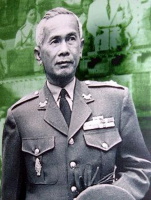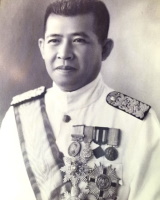- Home
- Democracy Monument
- 1932 coup
The 1932 coup - the end
to absolute monarchy
in Thailand
By Eric Lim
The 1932 coup is widely believed to be the first coup in Thailand. It wasn't; the first coup was in 1912, when a group of junior officers, fired by the Chinese revolution a year earlier, tried to seize power.
They failed. The coup on 24 June 1932, however, succeeded and brought an end to absolute monarchy in Thailand.
The seeds of the 1932 coup were first being sown in the early 1920's, during the reign of King Rama VI or King Vajiravudh (1910 – 1925). That was when Thailand started experiencing severe fluctuations in rice production which had a severe impact on state revenues.
Coupled with extravagant state expenditures, this caused a huge trade deficit and foreign debt.
Have you been caught in a coup in Bangkok? Share your coup experience
In 1925, when
King Rama VII or King Prajadhipok ascended the
throne, the economy continued to deteriorate as the deficit grew. With the rise
of nationalism and economic socialism, some of the educated urban class was
starting to question the status quo.
The Great Depression of the 1930's hit Thailand like a thunderbolt. From 1930 – 1932, rice prices fell by more than 60% and land prices by 90%! Economic belt-tightening and tax increases hit the state employees and urban middle-class in Bangkok hardest.
To make matters worse, Thailand ill-advisedly stayed on the gold standard when others floated their currencies. This caused Thai rice, the main export, to cost more than rice sold by countries off the gold standard. The overvalued Thai baht caused huge outflows of gold from the country.
Against this backdrop, the Promoters, a group of military officers and
civilians staged the 1932 coup on 24 June 1932.
The Promoters consisted of two factions:
- the People's Party, a group of young intellectuals educated overseas led by
a young French educated lawyer, Pridi Banomyong
- and the military faction led by military officers Phraya Phahon and Phibun Songkram, 114 members in all.
All three men were to be Prime Ministers in the next 15 years.
The 1932 coup swiftly launched at dawn was over by noon the same day! Many people were hardly aware of it. King Rama VII acceded to the demands to avoid bloodshed and agreed to serve as the constitutional monarch.
The transition to constitutional government called for a national assembly of 70 appointed members in the first stage. This was to be followed six months later, with half the assembly appointed and half elected.
The final stage called for full elections when the half the population had completed primary education or within ten years which ever was sooner.
On 10 December 1932 the permanent constitution came into force.
The 1932 Coup ended 150 years of absolute monarchy under the Chakri dynasty and irreversibly changed the face of Thai politics. Within a year in June 1933, another coup forced a change of government. This trend of coups was to persist for the next seven decades.
In October 1933, a rebellion by provincial garrisons led by Prince Boworadet, a former Minister of War, brought the country to the brink of civil war. Government troops led by Lieutenant-Colonel Phibun Songkhram defeated the rebels.
Relations between the government and the royalists deteriorated further as a result of this royal rebellion. On 2 March 1935, King Rama VII abdicated leaving many to ponder on his profound observation that Thailand in 1932 was not ready for democracy.
24 June 2007 - 75 years later
Until 1957, 24 June was the National Day. After Field Marshall Phibun, the last of the Promoters, was disposed of in a coup in 1957 by Field Marshall Sarit Thanarat, 24 June was dropped as a national holiday.
The move was an attempt to scrub the 24 June 1932 coup and all those involved from collective memory.
But our history frequently returns to haunt us. After 75 years, 18 coups and 17 constitutions, the country was back under military rule after the coup on 19 September 2006.
Afternote
The 18th constitution was passed in a national referendum on 19 August 2007. After the general elections in 23 December 2007, a new civilian government took office in late January 2008.
The course of political history has gone through another familiar cycle of coup-constitution-elections-coup. With the growing fatigue over the current political morass, the memory of 24 June 1932 is revived, a cry for a real change.
But after the elections, when events enter a new cycle, will the 24 June 1932 coup fade away again only to be recalled annually by academics and selected groups?
To return to the Democracy Monument.
Related pages
My Journey through Thailand Part I The First Steps
This is my second e-book and the first in the series of travel journals on my trips to explore the various provinces in Thailand. This edition, which covers my travels from late 2009 to mid-2013, will guide you to historical sites, cultural monuments and exquisite Thai handicraft, across a vast spectrum of cultural and ethnic diversity.
You can have a virtual tour with this e-guide book or take the first steps yourself in this journey through Thailand.
My Kindle e-book

Search Tour Bangkok Legacies with DuckDuckGo
Related pages
My Journey through Thailand
Part I The First Steps
My Kindle edition

My Smashwords edition






